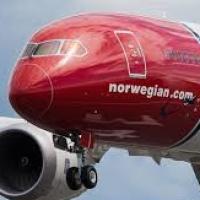
A struggle against outsourcing
The 11-day long pilots’ strike at budget airline, ’Norwegian’, achieved some concessions but the company, armed to the teeth with the backing of both capital and the state, turned out to be a strong and difficult opponent. What was needed was joint action by all the affected unions from the very beginning.
The pilots were striking for a collective agreement in which they would be employed by the parent company, ’Norwegian’, instead of subsidiaries and agencies. They fear being replaced by pilots with lower wages and conditions. ’Norwegian’ is the ninth largest airline in Europe, having rapidly expanded in recent years, and the strike affected 150,000 passengers.
The trend in the airline industry is to outsource the work force. For example, all Swedish cabin crew working for ’Norwegian’ are employed by an agency, Proffice, while at Ryanair, 75 percent of the pilots are self-employed. In the midst of the strike, ’Norwegian’ informed the pilots that they had 24 hours to oppose being moved from the parent company to three different companies in Sweden, Norway and Denmark. "We can confirm that this is a severe violation of both Swedish and European legislation, as well as what is acceptable and established on the Swedish labour market", wrote the Swedish Airline Pilots Association.
The demand for collective agreements and direct employment by the parent company was the key demand during the strike. The pilots’ union, Parat, says the strike failed to win a collective agreement, and achieved only what is usually called an agreement "similar" to a collective agreement.
Parat leader, Hans-Erik Skjæggerud, says that they achieved was similar to what the cabin crew got last year: "It is a commitment that involves the parent company ensuring that there are pilots in Norway, Sweden and Denmark to fly planes within and between countries. This is what is most important for our members".
The pilots have also achieved an employment guarantee for three years, compared to the two years that was on the table before the strike. Parat agreed to a new pension scheme for those who have more than 15 years left until retirement as well as increased flexibility in working hours.
The pilots were pressured by the fear that ’Norwegian’ would be put into bankruptcy and that they would lose everything. The company seemed to be ready to go to any lengths. An assessment by airline company analyst, Jacob Pedersen, at the bank Sydbank, is that the strike cost ’Norwegian’ €50 million.
Not until 10 March, on the eleventh day of the strike, did the Nordic Transport Workers’ Federation appeal to its member organisations, with 360,000 members, for solidarity strikes.
Common strategy
A key lesson of the strike is the importance of having a common strategy from the start – something that is particularly required in today’s deregulated market that looks more like that of the 1800s than the 1900s.
Every strike also needs a strategy to win over public opinion. According to the Norwegian daily left-wing newspaper, Klassekampen, public opinion was won over by the CEO and owner of ’Norwegian’, Bjørn Kjos. Throughout the strike, the media portrayed it as a personal conflict between him and the pilots, who are still perceived as highly paid. However, they earn nothing compared to Kjos who has a fortune of three billion NOK (more than €300 million) and who acts as a neoliberal guru with significant influence and power in Norway’s politics.
Some strike-breakers were also used during the strike, which has led to a debate in which Parat, YS (the trade union federation) and the Centre Party want to strengthen the Working Environment Act against scabbing. ’Norwegian’ has used the pilots employed by their subsidiaries to fly planes.
"Kjos has been to the forefront when it comes to dismantling safety in the workplace. The situation is unsustainable”, says Per Olaf Lundteigen from the Centre Party. Among other things, ’Norwegian’ demanded a list of members from the Swedish Pilot Association (SPA).
"On Wednesday, ’Norwegian’, via their legal representatives, demanded a list of the names of SPA members working for Norwegian and that if we didn’t hand them over, they would pursue legal action and claim damages caused by the refusal of our striking members to work. The right to organise in Sweden is inviolable and as such, we can obviously not cooperate with ’Norwegian’’s demands for a list of names of individual members”, replied the Swedish Pilots’ Association.
Contract negotiations are now underway at Scandinavian Airlines, SAS. These have already been preceded by a strike in late January by 1,300 cabin crew at Copenhagen’s airport, Kastrup, which the Labour Court classified as a "wildcat" strike. The background to this is an austerity package that SAS hope will save them 545 million SEK (€50 million), and is the sixth such package in the last 12 years.
SAS is buying the budget airline, Cimber, in order to exploit worse and cheaper conditions for employees there. SAS has already decided to move 147 employees over to Cimber. After the wildcat strike, SAS suspended 27 employees, accusing them of being "agitators". Against these methods of the 1800s, a united and militant trade union resistance is needed.

Be the first to comment